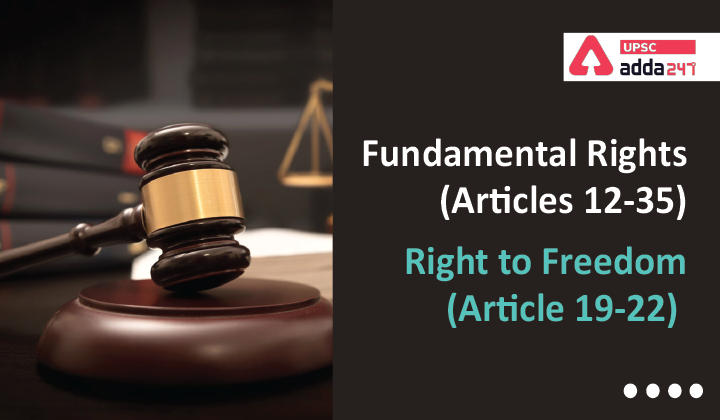Table of Contents
विधि के समक्ष समता (अनुच्छेद 14-18)- यूपीएससी ब्लॉग हेतु प्रासंगिकता
- जीएस पेपर 2: भारतीय संविधान- ऐतिहासिक आधार, विकास, विशेषताएं, संशोधन, महत्वपूर्ण प्रावधान एवं आधारिक संरचना।
मूल अधिकार (अनुच्छेद 12-35)- पृष्ठभूमि
- मूल अधिकारों के बारे में: भारत के संविधान के अंतर्गत प्रत्याभूत मूल अधिकार अपनी प्रकृति में मौलिक हैं क्योंकि उन्हें देश की मूलभूत विधि के अंतर्गत सम्मिलित किया गया है।
- अधिकारों का शाब्दिक अर्थ उन स्वतंत्रताओं से है जो व्यक्तिगत कल्याण के साथ-साथ संपूर्ण समुदाय के कल्याण हेतु आवश्यक हैं।
- मूल अधिकार (अनुच्छेद 12-35) जाति, धर्म, लिंग इत्यादि के आधार पर विभेद के बिना लागू होते हैं।
- मूल अधिकारों का मुख्य अधिदेश: भारत में राजनीतिक लोकतंत्र के आदर्शों को प्रोत्साहित करने के उद्देश्य से भारतीय संविधान में मूल अधिकार प्रदान किए गए हैं।
- मूल अधिकारों के स्रोत: भारतीय संविधान के मूल अधिकार (फंडामेंटल राइट्स) की उत्पत्ति अमेरिकी संविधान (संयुक्त राज्य अमेरिका के अधिकार विधेयक/ यूनाइटेड स्टेट्स बिल ऑफ राइट्स) से हुई है।
यूपीएससी एवं राज्य लोक सेवा आयोगों की परीक्षाओं हेतु नि शुल्क अध्ययन सामग्री प्राप्त करें
स्वतंत्रता का अधिकार (अनुच्छेद 19-22)- प्रमुख बिंदु
- स्वतंत्रता का महत्व: स्वतंत्रता प्रत्येक जीवित प्राणी की सर्वाधिक प्रिय इच्छा है। मनुष्य निश्चित रूप से स्वतंत्रता चाहता है एवं उसे इसकी आवश्यकता है।
- स्वतंत्रता के अधिकार के बारे में: भारत का संविधान अपने समस्त नागरिकों को स्वतंत्रता का अधिकार प्रदान करता है। मूल अधिकारों के तहत स्वतंत्रता का यह अधिकार अनुच्छेद 19-22 के अंतर्गत अनुबद्ध है।
स्वतंत्रता का अधिकार (अनुच्छेद 19-22) – प्रमुख प्रावधान
स्वतंत्रता के अधिकारों की चार श्रेणियां निम्नलिखित हैं जिनका उल्लेख नीचे किया गया है-
- 6 अधिकारों का संरक्षण (अनुच्छेद 19): संविधान का यह अनुच्छेद निम्नलिखित छह स्वतंत्रताओं का प्रावधान करता है-
- वाक् एवं अभिव्यक्ति की स्वतंत्रता
- शांतिपूर्वक तथा निरायुध एकत्रित होने होने की स्वतंत्रता
- संगम या संघ अथवा सहकारी समितियों के गठन का अधिकार।
- भारत के संपूर्ण राज्य क्षेत्र में स्वतंत्र रूप से ब्राह्मण का अधिकार।
- भारत के राज्यक्षेत्र के किसी भी भाग में निवास करने एवं बसने का अधिकार।
- किसी भी वृत्ति का अभ्यास करने या कोई उपजीविका, व्यापार या व्यवसाय करने का अधिकार।
- अपराधों के लिए दोषसिद्धि के संबंध में संरक्षण (अनुच्छेद 20): संविधान का अनुच्छेद 20 अपराधों के लिए दोषसिद्धि के संबंध में सुरक्षा प्रदान करता है।
- कोई पूर्वव्यापी/कार्योत्तर कानून नहीं: किसी को ऐसे कार्य के लिए दोषी नहीं ठहराया जा सकता है जो उसके कारित किए जाने के समय अपराध नहीं था एवं किसी को भी उसके कारित किए जाने के समय प्रचलित कानून में प्रावधान किए गए दंड से अधिक दंड नहीं दिया जा सकता है।
- यह प्रावधान दीवानी या कराधान संबंधी कानूनों या यहां तक कि आपराधिक मुकदमों, निवारक निरोध मामलों पर भी लागू नहीं होता है।
- कोई दोहरा दंड नहीं: किसी पर एक ही अपराध के लिए एक से अधिक बार वाद/मुकदमा नहीं चलाया जा सकता है एवं न ही दंडित किया जा सकता है।
- यह प्रावधान विभागीय अथवा प्रशासनिक प्राधिकारों के समक्ष कार्यवाही की स्थिति में उपलब्ध नहीं है।
- कोई स्व-अभियोग नहीं: किसी को भी अपने स्वयं के विरुद्ध साक्षी बनने हेतु बाध्य नहीं किया जा सकता है।
- कोई पूर्वव्यापी/कार्योत्तर कानून नहीं: किसी को ऐसे कार्य के लिए दोषी नहीं ठहराया जा सकता है जो उसके कारित किए जाने के समय अपराध नहीं था एवं किसी को भी उसके कारित किए जाने के समय प्रचलित कानून में प्रावधान किए गए दंड से अधिक दंड नहीं दिया जा सकता है।
- प्राण एवं दैहिक स्वतंत्रता की सुरक्षा (अनुच्छेद 21): जैसा कि अनुच्छेद 21 में प्रावधान किया गया है, विधि द्वारा स्थापित प्रक्रिया के अन्यथा किसी को भी उसके प्राण एवं दैहिक स्वतंत्रता से वंचित नहीं किया जा सकता है।
- कुछ मामलों में गिरफ्तारी तथा नजरबंदी के विरुद्ध संरक्षण (अनुच्छेद 22): जब भी किसी व्यक्ति को गिरफ्तार किया जाता है, तो उसे गिरफ्तारी के आधारों/कारणों के बारे में जितना शीघ्र हो सके, सूचित किया जाना चाहिए एवं उसे अपनी पसंद के विधि व्यवसायी से परामर्श करने तथा स्वयं का बचाव करने की अनुमति प्रदान की जानी चाहिए।
- गिरफ्तार/निरुद्ध व्यक्ति को ऐसी गिरफ्तारी के 24 घंटे के भीतर निकटतम मजिस्ट्रेट के समक्ष पेश किया जाना चाहिए, सिवाय उस व्यक्ति के जिसे निवारक निरोध कानून के तहत निरुद्ध किया गया है।
- निवारक निरोध कानून के तहत निरुद्ध किए गए व्यक्ति के मामले को भी उसकी गिरफ्तारी के तीन माह की अवधि के भीतर एक सलाहकार बोर्ड को संदर्भित किया जाना होता है।
| मूल अधिकार (अनुच्छेद 12-35) – भारतीय संविधान का भाग III: स्रोत, अधिदेश तथा प्रमुख विशेषताएं | भारत के राष्ट्रपति का वीटो पावर | राज्य के नीति निदेशक तत्वों का वर्गीकरण (डीपीएसपी) | न्यायाधीशों की नियुक्ति के लिए कॉलेजियम प्रणाली |
| मौलिक कर्तव्य (अनुच्छेद 51ए) | भाग IV-ए | भारतीय संविधान | भारतीय संविधान और उनके स्रोत: देशों से उधार ली गई विशेषताओं की सूची | 42वां संविधान संशोधन अधिनियम, 1976 | संविधान (127वां संशोधन) विधेयक, 2021 |
| विगत 15 संवैधानिक संशोधन | अनिश्चित काल के लिए स्थगन/एडजर्नमेंट साइन डाई | अखिल भारतीय न्यायिक सेवाएं | न्यायालय की अवमानना |





 TSPSC Group 1 Question Paper 2024, Downl...
TSPSC Group 1 Question Paper 2024, Downl...
 TSPSC Group 1 Answer key 2024 Out, Downl...
TSPSC Group 1 Answer key 2024 Out, Downl...
 UPSC Prelims 2024 Question Paper, Downlo...
UPSC Prelims 2024 Question Paper, Downlo...
